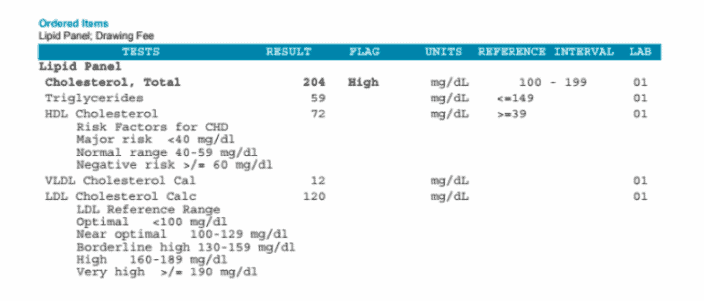Overview
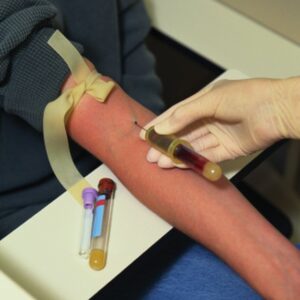 Blood laboratory tests are helpful in evaluating your health status. Blood tests allow your doctor to see a detailed analysis of disease markers, the nutrients and waste products in your blood, as well as how various organs (e.g., kidneys and liver) are functioning. If you’re like most people, you’ve probably looked over the alphabet soup of acronyms and abbreviations in your blood test results and wondered what it all means.
Blood laboratory tests are helpful in evaluating your health status. Blood tests allow your doctor to see a detailed analysis of disease markers, the nutrients and waste products in your blood, as well as how various organs (e.g., kidneys and liver) are functioning. If you’re like most people, you’ve probably looked over the alphabet soup of acronyms and abbreviations in your blood test results and wondered what it all means.
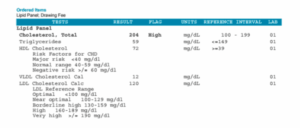 Your BTF doctor is trained in interpreting your blood lab tests and making recommendations to your lifestyle that can positively influence your results and overall health. It is important to realize that laboratory results may be outside of the so-called “normal range” for many reasons. These variations may be due to such things as ethnicity, nutrition, age, sex, menstrual cycle, degree of physical activity, problems with collection and/or handling of the specimen, non-prescription drugs (aspirin, cold medications, vitamins, etc.), prescription drugs, alcohol intake and a number of non-illness-related factors. Any unusual or abnormal results should be discussed with your physician. It is not possible to diagnose or treat any disease or problem with a blood test alone. It can, however, help you to learn more about your body and detect potential problems in early stages when treatment or changes in personal habits can be most effective.
Your BTF doctor is trained in interpreting your blood lab tests and making recommendations to your lifestyle that can positively influence your results and overall health. It is important to realize that laboratory results may be outside of the so-called “normal range” for many reasons. These variations may be due to such things as ethnicity, nutrition, age, sex, menstrual cycle, degree of physical activity, problems with collection and/or handling of the specimen, non-prescription drugs (aspirin, cold medications, vitamins, etc.), prescription drugs, alcohol intake and a number of non-illness-related factors. Any unusual or abnormal results should be discussed with your physician. It is not possible to diagnose or treat any disease or problem with a blood test alone. It can, however, help you to learn more about your body and detect potential problems in early stages when treatment or changes in personal habits can be most effective.
Note on normal ranges (also called reference intervals): Most blood labs set the normal result range for a particular test so that 95% of healthy patients fall within the normal range. That means that 5% of healthy patients fall outside of the normal range, even when there is nothing wrong with them. Thus an abnormal test does not necessarily mean that there is something wrong with you. Statistically if you have 20 or 30 individual tests run as part of a panel, chances are 1 or 2 will be slightly outside the normal range. Part of what you see your doctor for is to interpret whether or not these changes are meaningful.
This review is a brief summary of the most common tests and is not intended to be comprehensive or replace discussion of your results with your health care team.
Complete Blood Count (CBC)
A CBC measures the different types of cells in the blood. It’s one of the most common blood tests and is usually a part of routine lab work. It can also be helpful in diagnosing things like infections, blood diseases, and immune system disorders. These are the most relevant:
White Blood Count (WBC) is the number of white blood cells. These blood cells help fight infection. High WBC can be a sign of infection. WBC is also increased in certain types of leukemia. Low white counts can be a sign of bone marrow diseases or an enlarged spleen.
Red Blood Count (RBC) is the number of red blood cells. These blood cells carry oxygen throughout the body. Low oxygen levels, misuse of certain drugs and blood cancers can cause a high red blood cell count. A low red blood cell count can be caused by anemia, leukemia, malnutrition, kidney failure and sometimes in women with pregnancy or heavy menstrual flow.
Hemoglobin (Hgb) and Hematocrit (Hct) – The hemoglobin is the amount of oxygen carrying protein contained within the red blood cells. Hematocrit is the percentage of your blood that is made up of red blood cells. Low Hgb or Hct suggest an anemia. Anemia can be due to nutritional deficiencies, blood loss, destruction of blood cells internally, or failure to produce blood in the bone marrow. High Hgb can occur due to lung disease, living at high altitude, or excessive bone marrow production of blood cells.
Mean Corpuscular Volume (MCV) – This is the average size of your red blood cells and helps diagnose a cause of an anemia. Low values suggest iron deficiency, high values suggest either deficiencies of B12 or Folate, ineffective production in the bone marrow, or recent blood loss with replacement by newer (and larger) cells from the bone marrow.
MCH (mean corpuscular hemoglobin) – This is the average amount of hemoglobin in each red blood cell.
MCHC (mean corpuscular hemoglobin concentration) – This is the average concentration of hemoglobin in blood.
Platelets – This is the number of cells that plug up holes in your blood vessels and prevent bleeding. High values can occur with bleeding, cigarette smoking or excess production by the bone marrow. Low values can occur from premature destruction states such as Immune Thrombocytopenia (ITP), acute blood loss, drug effects (such as heparin), infections with sepsis, entrapment of platelets in an enlarged spleen, or bone marrow failure from diseases such as myelofibrosis or leukemia.
Some CBCs come with a “diff,” which stands for differential. It’s a way to break down the different types white blood cells in the blood. Each one is measured by a percentage:
Neutrophils – These white blood cells fight infection.
Lymph (lymphocytes) – These white blood cells learn how to recognize different infections.
Monocyte – These cells remove damaged tissue.
Eos (eosinophils) – This type of white blood cell fights parasites. It also responds to allergens.
Baso (basophils) – These cells play a part in allergic reactions by releasing histamine.
Immature Granulocytes -These cells are immature white blood cells. The presence of immature granulocytes in blood test results usually means that your body is fighting an infection or inflammation.
Comprehensive Metabolic Panel
The comprehensive metabolic panel (CMP) measures 14 different substances in your blood. It provides important information about your body’s chemical balance and metabolism. The CMP includes glucose, waste products, an electrolyte panel (also referred to as a Basic Metabolic Panel (BMP)), uric acid and liver function tests.
Glucose – This is a measure of the sugar level in your blood. High values are associated with eating before the test, and diabetes. The normal range for a fasting glucose is 70 -99 mg/dl. According the the 2003 ADA criteria, diabetes is diagnosed with a fasting plasma glucose of 126 or more. A precursor, Impaired Fasting Glucose (IFG) is defined as reading of fasting glucose levels of 100 – 125. Sometimes a glucose tolerance test, which involves giving you a sugary drink followed by several blood glucose tests, is necessary to properly sort out normal from IFG or diabetes.
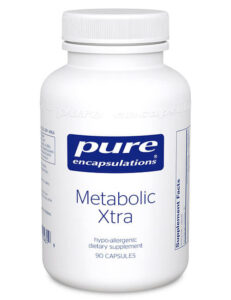 A supplement that we use at BTF that can assist with glucose-related issues is Metabolic Xtra. Metabolic Xtra provides a combination of nutrients to support healthy glucose metabolism and insulin receptor function.
A supplement that we use at BTF that can assist with glucose-related issues is Metabolic Xtra. Metabolic Xtra provides a combination of nutrients to support healthy glucose metabolism and insulin receptor function.
Hemoglobin A1c – Not part of the CMP, but measures the amount of glucose chemically attached to your red blood cells. Since blood cells live about 3 months, it tells us your average glucose for the last 6 – 8 weeks. A high level suggests poor diabetes control. This provides an alternative to the oral glucose tolerance or fasting glucose tests for the diagnosis of diabetes. A good range for this test is 4.8-5.4%.
A common issue, called metabolic syndrome, is related to glucose metabolism impairment.
Waste products:
Blood Urea Nitrogen (BUN) – This is a waste product produced in the liver and excreted by the kidneys. High values may mean that the kidneys are not working as well as they should. BUN is also affected by high protein diets and/or strenuous exercise which raise levels, and by pregnancy which lowers it.
Creatinine – This is a waste product largely from muscle breakdown. High values, especially with high BUN levels, may indicate problems with the kidneys.
Estimated Glomerular Filtration Rate (GFR) -This shows how well the kidneys are filtering your blood by removing waste and extra water to make urine.
Uric Acid – Not part of the CMP, but is normally excreted in urine. High values are associated with gout, arthritis, kidney problems and the use of some diuretics. A good value on this test is <5.0 mg/dL.
Electrolytes:
These are your sodium, potassium, chloride, CO2 and calcium levels.
Sodium is also regulated by the kidneys and adrenal glands. There are numerous causes of high and low sodium levels, but the most common causes of low sodium are diuretic usage, diabetes drugs like chlorpropamide, and excessive water intake in patients with heart or liver disease.
Potassium is controlled very carefully by the kidneys. It is important for the proper functioning of the nerves and muscles, particularly the heart. Any value outside the expected range, high or low, requires medical evaluation. This is especially important if you are taking a diuretic (water pill) or heart pill (Digitalis, Lanoxin, etc.).
CO2 reflects the acid status of your blood. Low CO2 levels can be due to either to increased acidity from uncontrolled diabetes, kidney disease, metabolic disorders, or low CO2 can be due to chronic hyperventilation.
Calcium is one of the most important minerals in your body. About 1% of the calcium in your body is in your blood. The rest is stored in your bones and teeth. Having the right amount of calcium in your blood is necessary for your nerves, muscles, and heart to work properly. It also helps blood vessels move blood throughout your body and helps release hormones that affect many body functions. If there is too much or too little calcium in the blood, it may be a sign of a wide range of medical conditions, such as bone disease, thyroid disease, parathyroid disorders or kidney disease.
 At BTF, we use Redmond’s Re-Lyte Hydration Mix, which is an excellent electrolyte supplement.
At BTF, we use Redmond’s Re-Lyte Hydration Mix, which is an excellent electrolyte supplement.
Proteins & Liver Enzyme Tests:
Total Protein is the sum of Albumin + Globulin, and is a measure of the amount and type of protein in your blood. It is a general index of overall health and nutrition.
Albumin helps keep blood from leaking out of blood vessels. It also helps move hormones, medicines, vitamins, and other important substances throughout the body. Albumin is made in the liver. Abnormal values can be a sign of kidney or liver conditions.
Globulin helps fight infection and move nutrients throughout the body. Some globulins are made by the liver. Others are made by the immune system.
A/G Ratio is the mathematical relationship between the above.
Bilirubin is a byproduct of broken-down old red blood cells. High or low bilirubin levels might indicate that some part of the process of breaking down and clearing old red blood cells isn’t working correctly.
Alkaline phosphatase is an enzyme found primarily in bones and the liver. Expected values are higher for those who are growing (children and pregnant women) or when damage to bones or liver has occurred or with gallstones. Low values are probably not significant.
Aspartate Aminotransferase (AST) & Alanine Transaminase (ALT) evaluates the health of your liver.These enzymes can increase when there is inflammation in the liver.
 At BTF, we use a 14-day liver detox program that can be helpful in restoring your liver enzymes. Check it out here: Should You Do a Liver Cleanse.
At BTF, we use a 14-day liver detox program that can be helpful in restoring your liver enzymes. Check it out here: Should You Do a Liver Cleanse.
Lipid Panel
Total Cholesterol is a type of fat found within all cells and is free floating in blood on molecules called lipoproteins. Cholesterol in itself is not all bad, in fact, our bodies need a certain amount of this substance to function properly. However, when the level gets too high, vascular disease can result. The acceptable levels that your doctor will recommend depend upon whether you are at high risk for cardiovascular disease.
The three most common of these lipoproteins containing cholesterol are Low Density Lipoprotein (LDL) and Very Low Density Lipoprotein (VLDL) which carries cholesterol to the tissues (“bad cholesterol”), and High Density Lipoprotein (HDL) which carries cholesterol to the liver to be flushed from the body (“good cholesterol”). Typically, you will want higher HDL compared to VLDL and LDL values.
Triglycerides are fat in the blood which, if elevated, have been associated with heart disease and pancreatitis. Note that alcohol and carbohydrates when consumed in excess are converted to triglycerides.
At BTF, we focus more on HDL/total cholesterol & triglyceride/HDL ratios instead of total cholesterol.
- HDL/total cholesterol ratio should be greater than 24% (example total cholesterol of 210 mg/dl and HDL of 55 mg/dl gives a ratio of 26%)
- Triglycerides/HDL ratio should be below 2 (example triglycerides of 100 mg/dl and HDL of 55 mg/dl gives a ratio of 1.8)
At BTF we have solutions to your cholesterol issues, please see Natural Treatments for High Cholesterol. A good supplement for cholesterol issues that we have at BTF is CholestePure from Pure Encapsulations.
Cardiac Risk Markers
hs Cardiac C-Reactive Protein (CRP) is a marker for inflammation which is useful in predicting vascular disease, heart attack or stroke and should be as low as possible. Optimal is less than 1, but lower is better.
The American Heart Association has developed a risk assessment calculator that incorporates your blood lipid levels with your age, ethnicity, blood pressure and lifestyle to give you a 10-year likelihood of suffering a cardiovascular event.
Vitamins & Minerals
Vitamin B12
Adequate levels of vitamin B12 are needed for your body to maintain a healthy nervous system, make red blood cells, and create DNA, the genetic material in all of our cells. Low Vitamin B12 can lead to anemia or nervous system symptoms.
Folate
Adequate levels of folate are vital for the making of healthy red blood cells and for the standard development of a fetus. Low folate can lead to anemia and may suggest the presence of intestinal disorders like Crohn’s disease or celiac disease.
Iron, Iron Binding Capacity (IBC) & Ferritin
The serum iron test measures the amount of iron in your blood. The iron-binding capacity (IBC) test looks at how well the iron moves through your body.
Iron is an important mineral that your body needs to stay healthy. Your body uses iron to make hemoglobin. This is the protein in your red blood cells that carries oxygen around your body. If you don’t have enough iron, you may not have enough hemoglobin. This is called iron-deficiency anemia.
Ferritin is a blood protein that contains iron. If a ferritin test reveals that your blood ferritin level is lower than normal, it indicates your body’s iron stores are low and you have iron deficiency. As a result, you could be anemic. If a ferritin test shows higher than normal levels, it could indicate that you have a condition that causes your body to store too much iron. It could also point to liver disease, rheumatoid arthritis, other inflammatory conditions or hyperthyroidism. Some types of cancer also can cause your blood ferritin level to be high.
 Vitamin D, 25-Hydroxy measures the amount of Vitamin D in your blood. Low levels can be associated with osteoporosis and immune system dysfunction. We now know that vitamin D is more than a vitamin but actually a vital hormone. It influences the function of other hormones as well, most notably thyroid and insulin. At BTF, we have Pure Encapsulations Vitamin D3.
Vitamin D, 25-Hydroxy measures the amount of Vitamin D in your blood. Low levels can be associated with osteoporosis and immune system dysfunction. We now know that vitamin D is more than a vitamin but actually a vital hormone. It influences the function of other hormones as well, most notably thyroid and insulin. At BTF, we have Pure Encapsulations Vitamin D3.
Magnesium is needed for healthy bones, heart, muscles, and nerves. It helps your body control energy, blood sugar, blood pressure, and many other processes. Some experts don’t think a blood test is the best way to find out your magnesium level. That’s because much of the magnesium in your body is stored in your bones and other places, not in the blood. Also, stress can send magnesium out of your cells and into your blood. This can make it seem like you have more magnesium in your body than you really have if you simply have a blood test.
Hormones
Estradiol – This is the most commonly measured type of estrogen measured. In women it varies according to their age, and whether they are having normal menstrual cycles. Hormone levels are also changed when taking birth control pills or estrogen replacement.
Testosterone – This is the male sex hormone, however both men and women have detectable testosterone levels. In men the major source is the testicles, in women the ovaries. In men, low levels of testosterone can indicate reduced testicular function, or ‘male hypogonadism’. This can be due to disease, aging, or damage to the testicles, ‘testicular or primary hypogonadism’. It may also be due to inadequate function of the pituitary gland or hypothalamus ‘secondary hypogonadism’ from diseases that affect the pituitary. High testosterone can occur from testosterone injections, testosterone receptor defects, or testosterone secreting tumors. In women, high testosterone levels can occur because of production from either the ovaries or adrenal glands. Adrenal hormones such as DHEA can be converted in to testosterone.
Note: High Intensity Interval Training or repetitive burst exercise of 30-60 seconds of maximal exercise followed by 60 seconds of rest at a 75-90% maximal heart rate can optimize testosterone and insulin sensitivity.
Prostate-Specific Antigen (PSA) – Is a protein produced by normal, as well as malignant, cells of the prostate gland. In addition to prostate cancer, several benign (not cancerous) conditions can cause a person’s PSA level to rise, particularly prostatitis (inflammation of the prostate) and benign prostatic hyperplasia (enlargement of the prostate). There is no evidence that either condition leads to prostate cancer, but someone can have one or both of these conditions and develop prostate cancer as well.
Fasting Insulin – Insulin is a hormone produced in your pancreas that has many effects on the body but the most important function insulin serves is helping your body extract chemical energy from food. When you eat a meal, your digestive tract breaks down carbohydrates and produces, among other things, a simple sugar called glucose. As your blood glucose rises above its baseline, your pancreas responds by secreting insulin to help you metabolize this glucose by shuttling it into cells for energy. This temporarily raises your level of insulin. When the excess glucose has been accounted for, your insulin level falls back to its baseline again (this is in a normal healthy body). Normal ranges should stay under 25 microunits per milliliter (μU/mL), but many metabolic health experts consider this range too high. For superior health it is recommended that fasting insulin should be 2-5 μU/mL. Hyperinsulinemia can be present even in the presence of normal glucose in the current findings for metabolic syndrome and diabetes mellitus.
Thyroid
Thyroid Cascade Profile/Thyroid Stimulating Hormone (TSH) : This protein hormone is secreted by the pituitary gland and regulates the thyroid gland. This hormone tells the thyroid to produce thyroid hormone. When it is high, it means the thyroid is not making enough thyroid hormone. When it is low, it can mean the thyroid is overactive and making too much thyroid hormone. This test can vary by time of day, so a single abnormal measurement does not always mean there is a problem. Also, levels tend to be higher in the elderly, so it is not uncommon to see mild elevations in people in their 70’s or 80’s that do not necessarily indicate a medical problem.
If your TSH is abnormal, then your provider may also check:
Thyroxine (Total T4) – This shows the total amount of the T4. The total T4 consists of two portions; T4 which is bound to carrier proteins and is inactive, and ‘free’ or unbound T4 that is available to cells and therefore active. High levels may be due to hyperthyroidism, however technical artifact occurs when the bound/inactive T4 is increased. This can occur when estrogen levels are higher from pregnancy, birth control pills or estrogen replacement therapy. A Free T4 (see below) can avoid this interference.
Thyroxine T4, Free – This test directly measures the free T4 in the blood. High levels suggest hyperthyroidism, and low levels are found in hypothyroidism and chronic illness.
There are 2 types of thyroid hormones easily measurable in the blood, thyroxine (T4) and triiodothyronine (T3). For technical reasons, it is easier and less expensive to measure the T4 level, so T3 is usually not measured on screening tests. Additionally, most diseases impact both T4 and T3 similarly, so T4 is typically measured first.
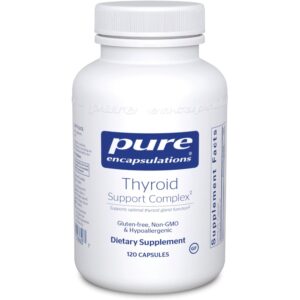 At BTF, we use Thyroid Support Complex which supports healthy thyroid function.
At BTF, we use Thyroid Support Complex which supports healthy thyroid function.
References:
Decoding Blood Tests: A GoodRX Guide to Lab Results.
2018 Prevention Guidelines Tool CV Risk Calculator.
Your Cholesterol Level Does Not Matter.
What Are Normal Levels of Insulin and Why Don’t We Test it More?


